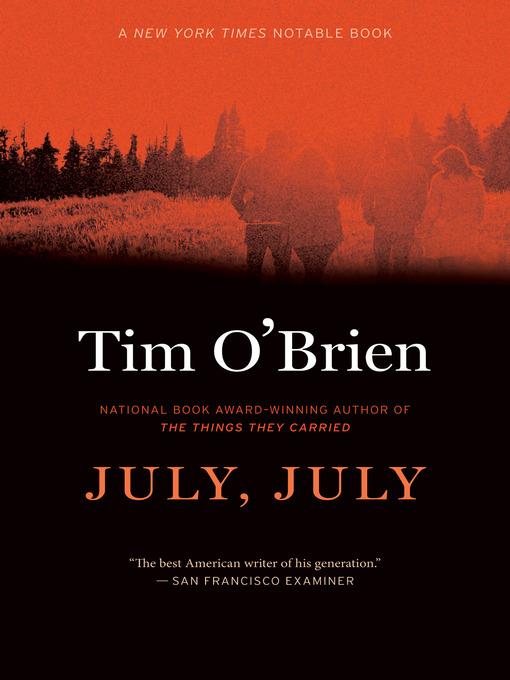
July, July
فرمت کتاب
ebook
تاریخ انتشار
2002
شابک
9780547523729
کتاب های مرتبط
- اطلاعات
- نقد و بررسی
- دیدگاه کاربران
نقد و بررسی

January 6, 2003
Like The Big Chill, National Book Award winner O'Brien's latest novel is about a group of college students from the radical days of the late 1960s. Assembled years later, the friends and acquaintances go through the usual motions of reminiscing, regretting, lusting, laughing and crying. Unlike the gang from that 1983 movie, though, this group is not brought together to mourn the death of a mutual friend but rather a 30-year class reunion. Yet they're still mourning, lamenting their lost youth, vibrancy, ideals, looks and health. Among the ruins, however, they find old friends, common struggles and rekindled passions. Although this is more a group of interwoven short stories or character studies than a traditional novel, O'Brien (The Things They Carried) fully fleshes out each character with aplomb. Actor and experienced audiobook reader Sanders offers a smooth and knowing delivery. His cynical, dry, yet humorous tone perfectly matches O'Brien's prose. The surface of this comic tale seems jaded and despairing, but sympathy, camaraderie, solidarity and love run deeply throughout. Simultaneous release with the Houghton Mifflin hardcover (Forecasts, July 1).

July 1, 2002
After a comedic hiatus with 1998's Tomcat in Love, O'Brien expands on themes he explored in some of his best-known earlier novels: memory, hope, love, war. It's July 2000 and members of the Darton Hall College class of 1969 are gathered, one year behind schedule, for their 30th reunion. Focusing on sharply drawn characters and life's pivotal moments rather than on a strong linear plot, O'Brien follows the ensemble cast (which includes a Vietnam vet, a draft dodger, a minister, a bigamous housewife and a manufacturer of mops) for whom "the world had whittled itself down to now or never," as they drink, flirt and reminisce. Interspersed are tales of other Julys, when each character experienced something that changed him or her forever. Jump-cutting across decades, O'Brien reveals past loves and old betrayals that still haunt: Dorothy failed to follow Billy to Canada; Spook hammered out a "double marriage"; Ellie saw her lover drown; Paulette, in a moment of desperation, disgraced herself and ruined her career. Comedy and pathos define the reunion days, while the histories often devastate. Because they are
such dramatic moments—a tryst that ends tragically, a near-death experience on the bank of a foreign river, the aftermath of a radical mastectomy—some of them feel contrived, almost hyperbolic. Still, this is a poignant and powerful page-turner, and a testament to a generation. National advertising; national author tour. (Oct. 1)Forecast:O'Brien is poised to secure a sizable readership in his age bracket, and the excerpts in the
New Yorker and
Esquire won't hurt either, but O'Brien's younger fans—all those who discovered
The Things They Carried when it was assigned to them in class—might be less intrigued by this "definitive novel" of the baby boom cohort.

June 1, 2002
The 30th reunion of Darton Hall College gives O'Brien the chance to play with a host of troubled characters. If you think you've seen this before, you're right: it was excerpted in The New Yorker and Esquire.
Copyright 2002 Library Journal, LLC Used with permission.

September 1, 2002
" July, July "for their 40th reunion. There's drinking, dancing, and groping, but the cheer is false; what's real is divorce, addiction, dashed hopes, boredom, mental illness, and failing bodies. The revelers' dialogue is witty, but their youthful contempt for any sort of spirituality has not aged well. They seem shallow and, bereft even of their good looks, irrelevant. A few have children but take no pride in them. They have no social conscience. They aren't worried about global warming. In fact, there is little of interest to say about the reunion, but thankfully, O'Brien breaks off from the festivities to flesh out individual lives. There's the lonely senior center activities director in Tucson, whose repressed lust draws her into a mawkish but effective horror story south of the border. One of O'Brien's most attractive characters steps from the pages of his now classic " The Things They Carried": a Vietnam vet--and amputee--who tries to silence the voices he hears with drugs. There's the bored suburban wife who flies away for an affair and then must deal with her lover's death; and the couple on their honeymoon, who hit a lucky streak at a casino, only to discover they aren't even slightly in love. In fact, " July, July" is a terrific story collection, but as a novel, while it is not exactly a failure, it disappoints. Maybe that's because the mirror O'Brien holds up to these folks in their fifties reveals only narcissists.(Reprinted with permission of Booklist, copyright 2002, American Library Association.)

























دیدگاه کاربران